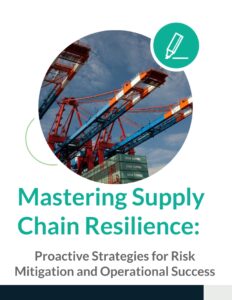From Source to Sustainability: The Impact of Biodiversity on Modern Manufacturing
As consumers continue to inquire about how the products are made, where ingredients and materials are sourced from and the impact it will have on the environment, brands must be prepared to reveal the details about their products.
Biodiversity, the rich tapestry of life on Earth and holds a profound significance not only in ecological terms but also within the realm of domestic manufacturing. As industries continually seek ways to optimize their operations, improve processes, and undergo digital transformations, they are increasingly recognizing the pivotal role that biodiversity plays in achieving these objectives. In this article, we will explore what biodiversity is, and more importantly, why it’s essential for domestic manufacturers, with a specific focus on how it can impact operations, process improvement, and digital transformation.
We will focus specifically on the operations component of biodiversity, but I will briefly explain the broader topic for a better understanding of this complex topic. As consumers are paying closer attention to where their products come from, how they are made, and what it all means for the environment. We must pay closer attention to the impacts of what we are producing and its long-term impact.
Understanding Biodiversity
Biodiversity, short for biological diversity, refers to the variety and variability of life on Earth. It encompasses all living organisms, their different species, ecosystems, and the genetic diversity within those species. Biodiversity is a measure of the richness and complexity of life in a particular area, and it plays a crucial role in maintaining the balance and health of ecosystems. This diversity includes the variety of plants, animals, microorganisms, and the ecological processes they form, making it an essential component of the planet’s natural heritage. Biodiversity is vital for ecosystem stability, ecological resilience, and the provision of various ecosystem services that sustain life and human well-being.
You may be asking why we are talking about this? Whether you’re a manufacturer or a brand purchasing raw materials that make up your product we all must factor into our production and afterlife of products and their packaging what its impact will be on both humans and our planet. It’s not enough to reduce your carbon footprint. We need to begin thinking differently about what we produce and its impact on future generations.
Biological diversity encompasses the variety and variability of life on our planet. It encompasses three main elements:
- Genetic Diversity: The diversity of genes within a species, which is vital for adaptation and resilience in changing environmental conditions.
- Species Diversity: The variety of different species within a particular area, playing a significant role in ecosystem stability and resilience.
- Ecosystem Diversity: The different types of ecosystems, including forests, wetlands, grasslands, and oceans, each provide unique services to support life on Earth.
We will cover Ecosystem Diversity in this article as it pertains to sustainability, longevity, cost effectiveness, and impact.
The Importance of Biodiversity for Domestic Manufacturers
If the goal is to not only have a successful and sustainable supply chain that also makes financial sense; we must also consider its long-term impact on the environment around its materials used, waste, and its sustainability.
Let’s quickly unpack what we mean when we say sustainability.
Sustainability refers to the capacity of a system, whether it’s an ecosystem, a business, or society, to maintain or improve its well-being and functionality over the long term while minimizing negative impacts on the environment, society, and future generations. Sustainability involves the responsible use of resources, the promotion of economic, social, and environmental balance, and the consideration of the interconnectedness of these factors to ensure that the needs of the present are met without compromising the ability of future generations to meet their own needs. In essence, sustainability aims to create a harmonious and enduring equilibrium between economic prosperity, social equity, and environmental stewardship. It’s important that we are clear as to why we are discussing the importance of a sustainable biodiversity ecosystem and what that means for operations. We are all responsible for sustainability and the impact our actions have for future generations.
Biodiversity is of paramount importance to domestic manufacturers for several compelling reasons, here are a few:
Raw Materials and Supply Chain Optimization
Biodiversity ensures a diverse and stable supply of raw materials, an indispensable requirement for manufacturing. Resources such as steel, diamonds, cacao, and cotton are all raw materials manipulated into another version of itself. You may not realize it, but diamonds are not just used for jewelry. Diamonds are often embedded in saws that are used to cut up roadways and masonry during construction.
Cocoa seed is used for infectious intestinal diseases according to RxList, such as diarrhea, asthma, bronchitis, and as an expectorant for lung congestion. The seed coat is used for liver, bladder, and kidney ailments; diabetes; as a tonic; and as a general remedy.
A variety of industries, including agriculture, pharmaceuticals, and textiles, rely on biodiversity for sourcing raw materials. By maintaining biodiversity, manufacturers can secure their supply chains and minimize the risks associated with over-reliance on a limited range of resources. This diversity can be a crucial aspect of supply chain optimization.
Sustainable Practices
Biodiversity plays a critical role in promoting sustainable manufacturing practices. Sustainable manufacturing aims to minimize the negative impacts on the environment, conserve resources, and reduce waste. A diverse ecosystem is better at regulating its own processes, including waste decomposition, which can help manufacturers minimize their ecological footprint.
Innovation Through Genetic Resources
Genetic diversity is particularly relevant to the world of domestic manufacturing. The diversity within species offers a valuable resource for research, development, and innovation. For manufacturers, this resource can lead to the creation of new products and technologies.
Industry example – Pharmaceutical Industry: The pharmaceutical sector extensively relies on biodiversity to develop new drugs and therapies. Many medicinal compounds have their origins in natural sources, such as plants and microorganisms. By exploring the genetic diversity of these sources, manufacturers can discover new pharmaceutical compounds, thus advancing medical science and bringing innovative products to the market.
When we look at The Johnson & Johnson talcum powder case, it highlights the importance of rigorous product testing and safety measures in industries that rely on natural resources. The case underscores the need for manufacturers to ensure the safety and integrity of their products, especially when they are based on natural resources, and the importance of genetic resources in research and development to identify and mitigate potential risks.
Natural Pollination
Many domestic manufacturers rely on agriculture, which, in turn, relies heavily on natural pollination services provided by bees, butterflies, and other pollinators. These insects are an integral part of our ecosystems, and their decline due to habitat loss and pesticide use can directly impact crop yields and, consequently, manufacturers’ supply chains.
Resilience and Adaptation
Biodiversity is integral to the resilience and adaptability of ecosystems. In a manufacturing context, this translates into operational resilience, or the organization’s ability to adapt and respond to disruptions or unexpected events. This resilience includes maintaining continuous operations, delivering products and services to customers without interruption. A diverse ecosystem can better withstand and recover from disruptions, whether from natural disasters, supply chain interruptions, or other external shocks.
Industry example – Automotive Industry: The automotive industry embraces biodiversity principles by adopting sustainability practices that enhance operational resilience. We see more and more cars on the road today that are environmentally friendly incorporating eco-friendly materials and designs inspired by nature. Manufacturers can produce vehicles that are not only environmentally responsible but also more resilient, energy-efficient, and adaptable to evolving market demands.
Sustainable manufacturing aims to minimize the negative impacts on the environment, conserve resources, and reduce waste. A diverse ecosystem is better at regulating its own processes, including waste decomposition, which can help manufacturers minimize their ecological footprint.
Digital Transformation and Sustainability
Digital transformation is increasingly becoming a top priority for manufacturers seeking to optimize operations and processes. Sustainable practices, which are closely tied to biodiversity conservation, play a crucial role in this transformation.
Case Study – Textile and Fashion Industry: The textile and fashion industry are leveraging digital transformation to enhance sustainability. Digital technologies enable manufacturers to track the environmental impact of their products, including their carbon footprint and water usage. By optimizing processes based on this data, manufacturers can reduce their ecological footprint while ensuring sustainable practices in the supply chain.
Regulatory Compliance and Reputation
Biodiversity conservation is often regulated by local and international laws, especially in ecologically sensitive areas. Manufacturers must comply with these regulations to operate legally and ethically.
Case Study – Brand Reputation: Failure to adhere to biodiversity regulations can have severe consequences, including legal penalties and damage to a company’s reputation. In today’s environmentally conscious world, a strong commitment to biodiversity and sustainability can boost a manufacturer’s reputation and attract consumers who favor eco-friendly products and ethical practices.
New Market Opportunities
Manufacturers that prioritize biodiversity and sustainability can tap into new markets and customer segments. Some consumers actively seek products from companies that demonstrate a commitment to environmental responsibility.
Case Study – Access to Eco-Conscious Markets: Manufacturers who incorporate biodiversity and sustainability principles into their operations can access markets focused on eco-conscious consumers. By offering environmentally friendly products and services, these companies can gain a competitive advantage and expand their market share.
In conclusion, biodiversity is far from being an abstract concept. It is a tangible and vital element for domestic manufacturers, deeply intertwined with operations, process improvement, and digital transformation. By recognizing the significance of biodiversity, manufacturers can not only enhance their operational efficiency and resilience but also foster innovation and meet the growing demand for sustainable products. In a world where environmental responsibility and sustainability are paramount, domestic manufacturers should consider biodiversity as a strategic imperative, as it contributes to their long-term success and the well-being of our planet.
If you are ready to improve your manufacturing operations, environmental impact, and sustainability practices; contact us today to get started.







